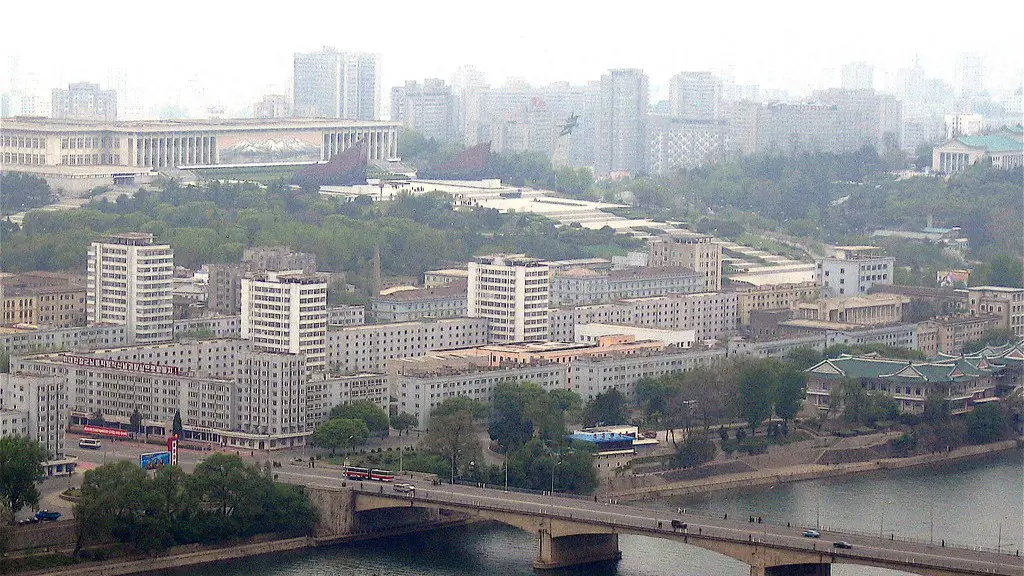When Will America Attack North Korea
Recently, North Korea has been placed in the international spotlight as a potential threat to global security. With escalating tensions between the United States and North Korea, one of the questions on the lips of many is when will America attack North Korea?
The US has long been wary of North Korea’s attempts to expand its nuclear capabilities, and in recent weeks, this has become a point of particular concern. US President Donald Trump has declared that all options are on the table and the US has the capability of launching a pre-emptive strike if it deems necessary. While the possibility of an attack is real, the prospects of an imminent attack remain unclear.
To understand why an attack, if at all, is a remote possibility, it is important to understand the underlying dynamics of the North Korea-US situation. North Korea has presented the US with a direct challenge to its international security policy, particularly with its consistent efforts to expand its nuclear capabilities. North Korea’s consistent non-adherence to international sanctions and UN resolutions on nuclear and ballistic missile technology has led to an increase in international displeasure and military tension.
The US has responded with a strong display of military might in the region, deploying additional USS Carl Vinson aircraft carriers and deploying additional ground troops to the region. Additionally, the US has also pushed through enhanced economic sanctions on North Korea, in a bid to curtail its nuclear and ballistic missile ambitions. This strategy, however, has not yielded expected results.
In addition to the conventional tactics of economic and military force, the US has been putting a large emphasis on diplomacy to resolve the tensions with North Korea. US Secretary of State Rex Tillerson has been traveling the world, meeting with leaders and diplomats in a bid to rally international support to pressure North Korea into abiding by international laws and also to get China to inject more pressure. This strategy has been met with mixed results and it remains to be seen if it will be successful.
At the moment, the prospects of an attack from the US against North Korea still remain slim. An attack, if it were to occur, would put the entire region at risk and could potentially lead to a major international crisis. The US is currently more focused on a diplomatic resolution, though there is no guarantee of success.
The current situation presents a real and serious challenge to the US and it’s allies, and one that cannot be addressed with a simple solution. As long as North Korea continues its nuclear and ballistic missile tests, the rest of the world must stay prepared for any sudden repercussions or developments.
US Military Strength
When it comes to the US-North Korea situation, it is important to understand the US’ military strength and its capacity to respond to threats. The US military is undoubtedly the most powerful in the world and has the capability to launch a pre-emptive strike if it deems necessary. With strategic bases in the region, the US has the ability to launch an attack with little warning and do so with overwhelming force.
The US has flexed its military muscle in the region before, such as in the Korean War, and has had significant success. An attack on North Korea would put the entire region at risk, however, and is something the US would only consider in the direst of circumstances.
The US must also weigh up the potential for increased international condemnation for an attack, which could inhibit its ability to rally international support in its effort to contain North Korea. Additionally, an attack also threatens to destabilize the region and unleash a chain of unpredictable consequences.
In the absence of a diplomatic or economic solution, the US will have to prepare itself for military intervention, if necessary. The US’ military strength must be weighed against the risk, however, and any decision to take action against North Korea would not be taken lightly.
North Korea’s Defense
It is important to also consider North Korea’s capabilities in terms of defense and how this impacts the US’ potential to launch an attack. North Korea is well known for its ability to heavily fortify its sites, with a range of underground tunnels and hidden military surfaces designed to detect and disrupt potential attacks. North Korea also has an extensive Scud missile arsenal, and is believed to be in possession of more than 20 nuclear warheads, making it capable of delivering a devastating retaliatory strike.
These factors, combined with North Korea’s unpredictable leadership and combustible rhetoric makes it a particularly difficult target to attack. An attack on North Korea would likely incur heavy casualties and very likely trigger a response from North Korea, and this must be taken into account when considering any military action.
At the same time, it should also be kept in mind that North Korea has a long-standing strategic alliance with China. China has previously acted as a balm to international tensions, often acting as a mediator between North Korea and the rest of the world. In this sense, it could be argued that China’s presence in the region could be beneficial, though there are no guarantees of this.
The bottom line is that any attack on North Korea, regardless of whether it is successful or not, will likely draw a heavy response from North Korea and its international allies. Therefore, any action taken would be high-risk and would require extensive and detailed planning.
International Reactions
The US’ potential attack on North Korea, would certainly have an effect on the international community as a whole, particularly given the potential implications of such an attack. The US, as a powerful player in the international arena, will inevitably draw criticism from many countries, both for its potential use of military force, and for its lack of diplomacy in seeking a diplomatic solution.
At the same time, the US’ actions can also be seen as necessary in order to protect the wellbeing of its citizens and its allies. Therefore, any reaction to an attack on North Korea would be complex, with many countries finding themselves between a rock and a hard place.
Internationally, the reaction would be even more divided, as North Korea has maintained many strategic alliances, particularly with China and Russia. While many countries in the region, such as Japan and South Korea, would likely voice their support of the US action, other countries such as China and Russia would likely offer more cautious reactions.
Any action taken by the US against North Korea would certainly create a ripple effect, and it would be impossible to predict the various reactions it would provoke. The US would have to carefully consider this before taking any decisive action.
The Nuclear Question
When considering the prospects of an attack on North Korea, the nuclear question is an important factor that must be taken into consideration. North Korea has moved forward with its development of nuclear weapons and ballistic missile capabilities, and the UN Security Council has condemned North Korea’s actions in this regard.
The US’ response to North Korea’s development of nuclear capabilities is of utmost importance and must be managed with the utmost care. If the US decides to take action against North Korea, it would have to consider how this would affect the stability of the region and how this could potentially trigger a global nuclear arms race. The US must also consider how other countries, such as China and Russia, may react to any action taken.
The ramifications of an attack on North Korea are difficult to accurately predict, and it is clear that the US must take the nuclear situation into consideration. While the US has the capability to launch a pre-emptive strike if absolutely necessary, this would have to be a decision taken only after careful consideration and with the security of the global community as the top priority.
Economic Impact
The economic impact of a potential US attack on North Korea is difficult to predict with certainty, as the situation is complex and there are a great variety of factors at play. An attack on North Korea would naturally lead to high levels of uncertainty and instability in the region and could disrupt trade and affect international markets.
An attack on North Korea could also destabilize global economies, as the ripple effect of such an event could cause huge fluctuations in monetary markets around the globe. In addition, North Korea’s alliance with China, a major economic player in the world today, could potentially affect markets in East Asia.
It is also possible that any attack on North Korea could lead to a regional conflict, further affecting the region and its economies. The best way to avoid such a scenario is to ensure a peaceful diplomatic solution is sought and the international community works together to ensure the security of the region.
The impact of an attack on North Korea would undoubtedly have serious implications for international economies, as any attack would undoubtedly have a negative impact in the short and long term. Therefore, a diplomatic solution is certainly preferred over a military one, as it would provide a better outcome for the stability of the global economy and the well-being of the international community.
Conclusion
When considering the question of when the US will attack North Korea, it is clear that any potential attack is a complex and high-risk matter. The US must consider the economics of the situation, the international reactions, the nuclear issue and the potential consequences of a military intervention.
The US must also consider its long-term strategy in dealing with the security challenge posed by North Korea. At the moment, the US is focused on a diplomatic solution and this is the preferred option for now. Any attack, if necessary, would need to be carefully planned and would require the support of the international community.
The US must both deter North Korea from furthering its illegal activities and also work to ensure the security and stability of the region and the world. The current tension between the US and North Korea is a complex matter that requires delicate handling and the US must assess all options to ensure the safety of its citizens and its allies.





